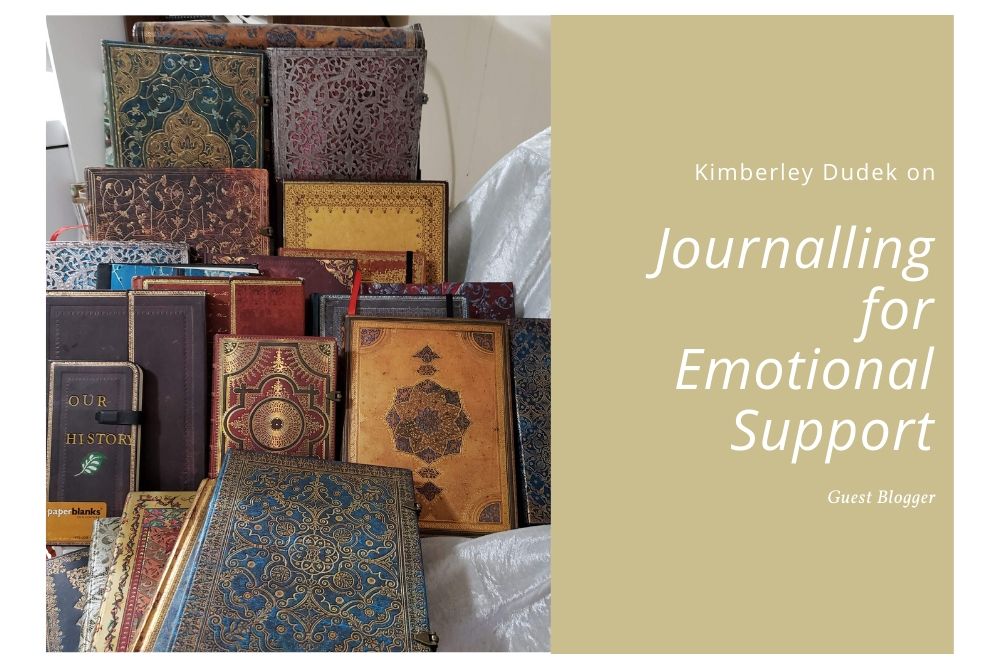Sometimes at the Endpaper Blog we get the unique opportunity to offer a platform to creative journallers from around the world. Today, we are excited to welcome Kimberley Dudek to the Endpaper Blog to share her personal perspective on the therapeutic benefits of journalling, particularly when it comes to sensory mental health disorders. Kim is the founder of Aspies Inc., a not-for-profit advocacy business focused on raising awareness of Asperger’s syndrome and giving those with Asperger’s a platform to tell their stories. You may also remember Kim from her role in our short document Mindfulness, Journalling and Mental Health.
You can learn about Kim and her work on her website: aspies.ca.
Everyone struggles with emotions in life. They can overwhelm and incapacitate us, leaving even the strongest person incapable of handling daily life. When a mental health disorder is added to the person’s life, dealing with emotions becomes even harder. It is difficult enough to cope with emotions and a mental health disorder at the same time but when that disorder is invisible, the ability to cope is nearly impossible.
People with invisible sensory mental health disorders such as Asperger’s syndrome and autism struggle far more with this than the public realizes. We struggle on multiple fronts with our emotions, which stem from the stigma, isolation and bullying we face in life.
People with mental health disorders often exhibit behaviours and traits that can cause them to be held on the fringes of society. Those with Asperger’s may exhibit behaviours such as “stimming,” tics, and full body movement as well as sudden intense sensory reactions known as meltdowns, which can create even more intense reactions by the rest of the world towards those with mental health disorders. People witnessing these types of behaviours end up stigmatizing those with mental health disorders, and thus they are seen to not fit the “social norms” and expectations of greater society. This stigma causes us immeasurable sorrow and pain.

Journalling as a form of support
People with mental health disorders can benefit enormously from journalling. Often, especially when we become nonverbal, unresponsive to others, writing things down helps us to release our feelings, thoughts, and emotions safely without harming others. A journal is like a friend. It is a place where we can write down what we are feeling in however much detail we want without fear of being ridiculed or brushed off. Emotions are very challenging for those with Asperger’s syndrome. We either feel them differently or we don’t feel them at all. Part of the problem is that those with Asperger’s don’t see “greyscale.” When it comes to emotions, those with Asperger’s feel them to a sensorily overwhelming extreme which can cause meltdowns in many cases.
Being overwhelmed by emotions – particularly the softer emotions such as love and compassion – is frightening to us because we are not used to them. A journal then also becomes a place to release our fears and go through anything else we may experience. Journalling also helps us in a myriad of other ways. When we get into fights with others from which we struggle to recover, when we feel overwhelmed in general…or as in a personal situation of mine, when a friend of mine ended up in the hospital suddenly… I recall that day in 2018 when I woke up. I was browsing through social media, and found a post from my friend’s fiancé, saying that my friend was in the hospital and was very sick…my heart broke so badly it wasn’t funny. Besides reaching out to everyone I knew to ask for help, prayers, etc., my journal, in combination with the gym, healthy eating, and meditation, became my way of taking care of myself during this time of distress. I used my journal to help curb the fixative behavioural aspect of my disability, which I knew would be a problem at a time like this. It was a huge help and a big relief to have a safe space to just let go.
Whether dealing with mental health disorders, illness, or other problems, journalling is a practice that everyone should do. It benefits our health in all ways including mental and emotional. It is also beneficial to those who work with and care for those with disabilities.
For those who may scoff at journalling, thinking it girly or geeky, etc, I encourage them to try it at least once… You may be surprised at the unexpected results.
Has journalling helped you overcome tough times?
Mental health affects us all. If you or someone you know needs help, you are not alone.
Call 1-800-273-8255 for the National Suicide Prevention Lifeline in the United States or 1-833-456-4566 for Crisis Services Canada.
Outside of North America, please visit the International Association for Suicide Prevention for a database of resources: www.iasp.info.





